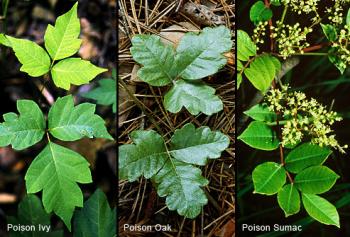Plant Dermatitis
June 20, 2019

It’s the time of year when many people are getting back into gardening, hiking, and just enjoying being outside in the nicer weather. With that comes the risk for plant dermatitis. Plant dermatitis is a term that means a skin rash that results from the oils of a poisonous plant. These plants include poison ivy, poison sumac, and poison oak. The compound the causes the allergic reaction in these plants is called urushiol, which is a colorless oil that can be found in the fruit, leaves, stem, roots, and sap of the plants.
You can be exposed to urushiol by coming in direct contact with the plant by touching or rubbing the plants, indirectly by touching something that has urushiol on it, like tools, animals, or clothing, or breathing in smoke when these plants are burned.
The best way to avoid plant dermatitis is to avoid contact with these poisonous plants. You can do this by wearing protective clothing (like long sleeves and long pants) and vinyl gloves (urushiol can go through rubber or latex gloves) when working or playing in areas where these plants can be found. Do not burn plants or brush that may contain poisonous plants. Barrier skin creams, such as lotion containing bentoquatum (like Ivy Block), may also offer some protection. If your skin does come in contact with these plants, you should gently wash your skin and under your nails with mild soap and water within the first ten minutes if possible.
After contact with urushiol in these poisonous plants, about 50% of people develop signs and symptoms of plant dermatitis. You can develop symptoms anywhere from four hours to four days after exposure. The severity of the reaction decreases by age, especially in people who have had mild reactions in the past. Symptoms of plant dermatitis include redness, swelling, fluid-filled blisters, and intense itching. The fluid from these blisters is NOT contagious and therefore cannot spread to another person.
Plant dermatitis usually resolves within one to four weeks even without treatment. Treatment is aimed at reducing itchiness and discomfort. Treatment can include oatmeal baths, cool compresses, calamine lotion, and steroid creams. For severe reactions, some patients may need a prescription oral steroid to help them.
We can help you if you think you have developed a plant dermatitis. Come see us here at Champlain Medical Urgent Care, Monday through Friday 8am-4pm.